- Home
- Lisa Kleypas
Cold-Hearted Rake Page 27
Cold-Hearted Rake Read online
Page 27
“Yes, my lady.” The elderly man had regarded her warmly, his gaze conveying an affection that he would never express in words. He was a disciplined and buttoned-up man, but he had always treated Helen and the twins with unfailing kindness, interrupting his work to help search for a lost doll, or to wrap his own handkerchief around a scraped elbow. Deep down, Helen had always known that of the three sisters, she was Quincy’s favorite, perhaps because their natures were somewhat similar. They both liked everything to be peaceful and quiet and in its place.
Helen’s unspoken bond with Quincy had been cemented by the shared experience of taking care of her father in his last days, after he had fallen ill from a long day of hunting in the cold and wet. Although Sims and Mrs. Church had done what they could to ease the earl’s suffering, it had been Helen and Quincy who had taken turns sitting at his bedside. There had been no one else: The twins hadn’t been allowed into his room for fear that the earl’s illness was catching, and Theo hadn’t come from London in time to say good-bye.
Upon learning that Quincy was leaving Eversby Priory, Helen had tried to be happy for him, rather than selfishly wish for him to stay. “Will you like living in London, Quincy?”
“I expect so, my lady. I will view it as an adventure. Perhaps it will be just the thing to blow the cobwebs out.”
She had given him a tremulous smile. “I will miss you, Quincy.”
The valet had remained composed, but his eyes had turned suspiciously bright. “When you visit London, my lady, I trust you will remember that I’m always at your service. You have only to send for me.”
“I’m glad that you’re going to take care of Mr. Winterborne. He needs you.”
“Yes,” Quincy had said feelingly. “He does.”
It would take some time, Helen thought, for Quincy to become familiar with his new employer’s habits, preferences, and quirks. Fortunately Quincy had spent decades in the practice of managing volatile temperaments. Winterborne certainly couldn’t be any worse than the Ravenels.
During the past two days, a group of Winterborne’s employees, including store managers, an accountant, and a pressman, had visited from London. They had spent hours with Winterborne in the family parlor, delivering reports and receiving instructions. Although Dr. Weeks had warned that too much exertion might hinder the healing process, Winterborne seemed to have drawn energy from the interaction with his employees.
“That store is more than a mere business to him,” West had told Helen, while Winterborne had been upstairs talking with his managers. “It’s who he is. It consumes all his time and interest.”
“But what does he do it for?” Helen had asked, perplexed. “Usually a man desires an income so that he can pursue more important things… time with family and friends… developing his talents, his inner life…”
“Winterborne has no inner life,” West had replied dryly. “He would probably resent any suggestion that he did.”
The employees had left this morning, and Winterborne had spent most of the day either in the parlor or in his bedroom, stubbornly maneuvering on his crutches without assistance, despite the doctor’s instructions not to set weight on his injured leg.
Looking around the doorjamb, Helen saw Winterborne sitting alone in the parlor, in a chair beside a walnut marble-topped table. He had accidentally knocked a stack of papers from the table, and they had settled on the floor around him. Leaning over awkwardly, he tried to retrieve the fallen pages without toppling from the chair.
Concern overcame Helen’s shyness, and she went into the room without a second thought. “Good afternoon, Mr. Winterborne.” She sank to her knees and gathered up the papers.
“Don’t trouble yourself with that,” she heard Winterborne say gruffly.
“No trouble at all.” Still kneeling, she looked up at him uncertainly. Her heart skipped a beat, and another, as she stared into the darkest eyes she had ever seen, a brown so deep it looked black, shadowed by thick lashes and set deep in a complexion of rich umber. His brutal handsomeness unnerved her. He could have been Lucifer himself, sitting there. He was much larger than she’d realized; even the cast on his leg didn’t help to make him seem less formidable.
She handed the papers to him, and their fingers touched briefly. Startled by a shock of awareness, she pulled back quickly. His mouth turned grim, his thick brows drawing together.
Helen rose to her feet. “Is there something I can do to make you more comfortable? Shall I send for tea or refreshments?”
He shook his head. “Quincy will bring a tray soon.”
She wasn’t certain how to reply. It had been easier to talk to him when he had been ill and helpless.
“Mr. Quincy told me that he will be working for you in London. I am glad, for both your sakes, that you’ve given him such an opportunity. He will be an excellent valet.”
“For what I’m paying him,” Winterborne said, “he’d better be the best in England.”
Helen was briefly nonplussed. “I have no doubt he will be,” she ventured.
Meticulously Winterborne neatened the stack of paper. “He wants to start by disposing of my shirts.”
“Your shirts,” Helen repeated, perplexed.
“One of my managers brought some of my clothes from London. Quincy could tell that the shirts were ready-made.” He glanced at her warily, assessing her reaction. “To be accurate,” he continued, “they’re sold half finished, so they can be tailored to the customer’s preference. The quality of the fabric is as high as any bespoke shirt, but Quincy still turns up his nose.”
Helen considered her reply carefully. “A man of Quincy’s profession has an exacting eye when it comes to details.” She probably should have left it at that. The discussion of a man’s clothing was entirely improper, but she felt that she should help him to understand Quincy’s concerns. “It’s more than just the fabric. The stitching is different in a bespoke shirt: The seams are perfectly straight and flat-felled, and the buttonholes are often hand-worked with a keyhole shape at one side to reduce the stress of the button’s shank.” She paused with a smile. “I would elaborate about plackets and cuffs, but I fear you would fall asleep in the chair.”
“I know the value of details. But where shirts are concerned…” He hesitated. “I’ve made a point of wearing the kind that I sell, so that customers know they have the same quality as the store’s owner.”
“That sounds like a clever sales strategy.”
“It is. I sell more shirts than any other store in London. But it didn’t occur to me that the upper class pays close attention to buttonholes.”
It had chafed his pride, she thought, to realize that he had put himself at a disadvantage when mingling with social superiors.
“I’m sure they shouldn’t,” Helen said apologetically. “There are far more important things for them to worry about.”
His gaze turned quizzical. “You speak as if you’re not one of them.”
She smiled slightly. “I’ve lived away from the world for so much of my life, Mr. Winterborne, that I sometimes wonder who I am, or if I belong anywhere.”
Winterborne studied her. “Trenear plans to take you and your sisters to London when you’ve finished mourning.”
Helen nodded. “I haven’t been to town since I was a child. I remember it as a very large and exciting place.” She paused, vaguely surprised that she was confiding in him. “Now I think I might find it… intimidating.”
A smile tugged at the corners of his mouth. “What happens when you’re intimidated? Run to the nearest corner and hide, do you?”
“I should say not,” she said primly, wondering if she were being teased. “I do what has to be done, no matter what the situation.”
Winterborne’s smile widened until she saw the flash of white teeth against that deep bronze complexion. “I suppose I know that better than most,” he said softly.
Understanding that he was referring to how she had helped him through the fever… and remembering
how she had held that black head in the crook of her arm, and bathed his face and neck… Helen felt a blush start. Not the ordinary kind of blush that faded soon after it started. This one kept heating and heating, spreading all through her until she was so uncomfortable that she could scarcely breathe. She made the mistake of glancing into his simmering coffee-black eyes, and she felt positively immolated.
Her desperate gaze settled upon the battered pianoforte in the corner. “Shall I play something for you?” She stood without waiting for a reply. It was the only alternative to bolting from the room. Out of the periphery of her vision, she saw Winterborne automatically grip the arms of his chair in preparation to rise, before he remembered that he was in a leg cast.
“Yes,” she heard him say. “I’d like that.” He maneuvered the chair a few inches so that he could see her profile as she played.
The pianoforte seemed to offer a small measure of protection as she sat at the keyboard and pushed up the hinged fallboard that covered the keys. Taking a slow, calming breath, Helen arranged her skirts, adjusted her posture, and placed her fingertips on the keys. She launched into a piece she knew by memory: the allegro from Handel’s Piano Suite in F Major. It was full of life and complexity, and challenging enough to force her to think about something besides blushing. Her fingers danced in a blur over the keys, the exuberant pace unfaltering for two and a half minutes. When she finished, she looked at Winterborne, hoping he had liked it.
“You play with great skill,” he said.
“Thank you.”
“Is that your favorite piece?”
“It’s my most difficult,” Helen said, “but not my favorite.”
“What do you play when there’s no one to hear?”
The gentle question, spoken in that accent with vowels as broad as his shoulders, caused Helen’s stomach to tighten pleasurably. Perturbed by the sensation, she was slow to reply. “I don’t remember the name of it. A piano tutor taught it to me long ago. For years I’ve tried to find out what it is, but no one has ever recognized the melody.”
“Play it for me.”
Calling it up from memory, she played the sweetly haunting chords, her hands gentle on the keys. The mournful chords never failed to stir her, making her heart ache for things she couldn’t name. At the conclusion, Helen looked up from the keys and found Winterborne staring at her as if transfixed. He masked his expression, but not before she saw a mixture of puzzlement, fascination, and a hint of something hot and unsettling.
“It’s Welsh,” he said.
Helen shook her head with a laugh of wondering disbelief. “You know it?”
“‘A Ei Di’r Deryn Du.’ Every Welshman is born knowing it.”
“What is it about?”
“A lover who asks a blackbird to carry a message to his sweetheart.”
“Why can’t he go to her himself?” Helen realized they were both speaking in hushed tones, as if they were exchanging secrets.
“He can’t find her. He’s too deep in love – it keeps him from seeing clearly.”
“Does the blackbird find her?”
“The song doesn’t say,” he said with a shrug.
“But I must know the ending to the story,” Helen protested.
Winterborne laughed. It was an irresistible sound, rough-soft and sly. When he replied, his accent had thickened. “That’s what comes o’ reading novels, it is. The story needs no ending. That’s not what matters.”
“What matters, then?” she dared to ask.
His dark gaze held hers. “That he loves. That he’s searching. Like the rest of us poor devils, he has no way of knowing if he’ll ever have his heart’s desire.”
And you? Helen longed to ask. What are you searching for? The question was too personal to ask even of someone she had known for a long time, much less a stranger. Even so, the words hovered on her tongue, begging to be spoken. She looked away and fought to hold them back. When she returned her gaze to Winterborne, his expression had become remote again. Which was a relief, because for a moment she’d had the alarming feeling that she was only a breath away from confiding every private thought and wish that she’d never told anyone.
To Helen’s great relief, Quincy arrived with the dinner tray. The valet’s white brows lifted fractionally as he saw her alone in the room with Winterborne, but he said nothing. As Quincy proceeded to arrange the flatware, glasses, and plate on the table, Helen regained her composure. She stood from the upholstered bench and gave Winterborne a neutral smile. “I will leave you to enjoy your dinner.”
His gaze swept over her, lingering at her face. “You’ll play for me again one evening?”
“Yes, if you like.” She left the parlor gratefully, steeling herself not to break into a run.
Rhys stared after Helen, while his brain sorted through every detail of the past few minutes. It was fairly clear that she had a disgust of him: She had recoiled from his touch, and she had trouble meeting his gaze. She had abruptly changed the conversation when it had strayed toward the personal.
Perhaps his looks weren’t to her taste. No doubt his accent was off-putting. And like the other sheltered young women of her class, she probably thought of the Welsh as third-rate barbarians. Helen knew that she was too fine for the likes of him – God knew Rhys wouldn’t argue.
But he was going to have her anyway.
“What is your opinion of Lady Helen?” he asked as Quincy arranged the meal on the table in front of him.
“She is the jewel of the Ravenels,” Quincy said. “A more kind-hearted girl you’ll never meet. Sadly, she’s always been overlooked. Her older brother received the lion’s share of her parents’ interest, and what little was left went to the twins.”
Rhys had met the twins a few days earlier, both of them bright-eyed and amusing, asking a score of questions about his department store. He had liked the girls well enough, but neither of them had captured his interest. They were nothing close to Helen, whose reserve was mysterious and alluring. She was like a mother-of-pearl shell that appeared to be one color, but from different angles revealed delicate shimmers of lavender, pink, blue, green. A beautiful exterior that revealed little of its true nature.
“Is she aloof with all strangers?” he asked, arranging a napkin on his lap. “Or is it only with me?”
“Aloof?” The valet sounded genuinely surprised. Before he could continue, a pair of small black spaniels entered the parlor, panting happily as they bounded up to Rhys. “Good heavens,” he muttered with a frown.
Rhys, who happened to like dogs, didn’t mind the interruption. What he found disconcerting, however, was the third animal that trotted into the room after them and sat assertively by his chair.
“Quincy,” Rhys asked blankly, “why is there a pig in the parlor?”
The valet, who was busy shooing the dogs from the room, said distractedly, “A family pet, sir. They try to keep him in the barn, but he will insist on coming into the house.”
“But why —” Rhys broke off, realizing that regardless of the explanation, it would make no sense to him. “Why is it,” he asked instead, “that if I kept livestock in my home, people would say I was ignorant or daft, but if a pig wanders freely in the mansion of an earl, it’s called eccentric?”
“There are three things that everyone expects of an aristocrat,” the valet replied, tugging firmly at the pig’s collar. “A country house, and a weak chin, and eccentricity.” He pushed and pulled at the pig with increasing determination, but the creature only sat more heavily. “I vow,” the valet wheezed, budging him only an inch at a time, “I’ll have you turned into sausage and collops by tomorrow’s breakfast!”
Ignoring the determined valet, the pig stared up at Rhys with patient, hopeful eyes.
“Quincy,” Rhys said, “look sharp.” He picked up a bread roll from his plate and tossed it casually in the air.
The valet caught it deftly in a white-gloved hand. “Thank you, sir.” As he walked to the door with the bread i
n hand, the pig trotted after him.
Rhys watched with a faint smile. “Desire,” he said, “is always better motivation than fear. Remember that, Quincy.”
Chapter 26
T
heo! Theo, don’t!
The nightmare was as vivid and intolerable as ever, the ground shifting so that every step landed askew as she ran toward the stables. She could hear Asad’s maddened whinnying in the distance. A pair of stablemen held on to the horse’s bridle, forcing him to stay still while her husband’s dominating figure swung up onto his back. The morning light fell with bright menace onto Asad’s golden form as his hooves churned and stomped.
Her heart thudded as she saw that her husband was holding a whip. Asad would die rather than submit to it. Stop! she cried, but the stablemen had released the bridle, and the horse had leaped forward. Wall-eyed and panicked, Asad reared, plunged, swelling his body to break his girth. Theo’s whip arm lifted and descended, again and again.

 Devil in Spring
Devil in Spring Sugar Daddy
Sugar Daddy Devil in Winter
Devil in Winter Dreaming of You
Dreaming of You Christmas Eve at Friday Harbor
Christmas Eve at Friday Harbor Love, Come to Me
Love, Come to Me Only With Your Love
Only With Your Love Suddenly You
Suddenly You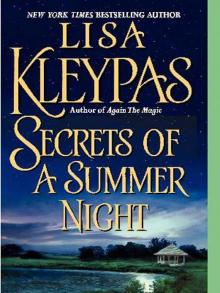 Secrets of a Summer Night
Secrets of a Summer Night Cold-Hearted Rake
Cold-Hearted Rake Where's My Hero?
Where's My Hero? Gifts of Love
Gifts of Love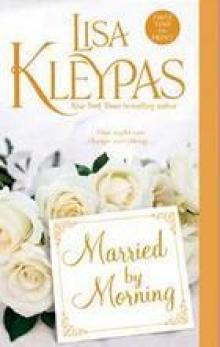 Married by Morning
Married by Morning Then Came You
Then Came You Wish List
Wish List Where Dreams Begin
Where Dreams Begin A Historical Christmas Present
A Historical Christmas Present Somewhere I'll Find You
Somewhere I'll Find You Scandal in Spring
Scandal in Spring Someone to Watch Over Me
Someone to Watch Over Me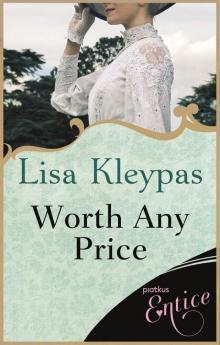 Worth Any Price
Worth Any Price Prince of Dreams
Prince of Dreams It Happened One Autumn
It Happened One Autumn Love in the Afternoon
Love in the Afternoon Devil's Daughter
Devil's Daughter A Wallflower Christmas
A Wallflower Christmas Tempt Me at Twilight
Tempt Me at Twilight Brown-Eyed Girl
Brown-Eyed Girl Mine Till Midnight
Mine Till Midnight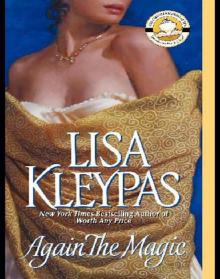 Again the Magic
Again the Magic Lady Sophia's Lover
Lady Sophia's Lover Because You're Mine
Because You're Mine Midnight Angel
Midnight Angel Smooth-Talking Stranger
Smooth-Talking Stranger Blue-Eyed Devil
Blue-Eyed Devil Hello Stranger
Hello Stranger Dream Lake
Dream Lake Devil's Daughter: The Ravenels Meet the Wallflowers
Devil's Daughter: The Ravenels Meet the Wallflowers A Christmas to Remember
A Christmas to Remember Smooth Talking Stranger
Smooth Talking Stranger Crystal Cove
Crystal Cove Marrying Winterborne
Marrying Winterborne Stranger in My Arms
Stranger in My Arms Devil in Disguise
Devil in Disguise Worth Any Price bsr-3
Worth Any Price bsr-3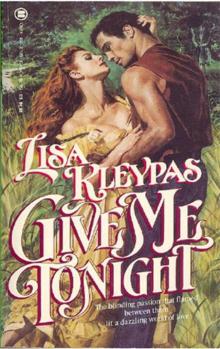 Give Me Tonight
Give Me Tonight Rainshadow Road fh-2
Rainshadow Road fh-2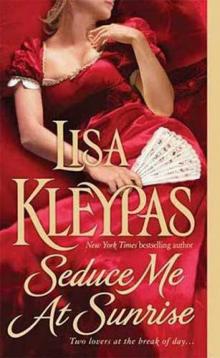 Seduce Me At Sunrise
Seduce Me At Sunrise I Will
I Will Someone to Watch Over Me bsr-1
Someone to Watch Over Me bsr-1 Lady Sophias Lover bsr-2
Lady Sophias Lover bsr-2 A Hathaway Wedding
A Hathaway Wedding A Hathaway Wedding (Hathaways Bk2.5)
A Hathaway Wedding (Hathaways Bk2.5) Worth Any Price - Bow Street 3
Worth Any Price - Bow Street 3 Christmas with Holly
Christmas with Holly